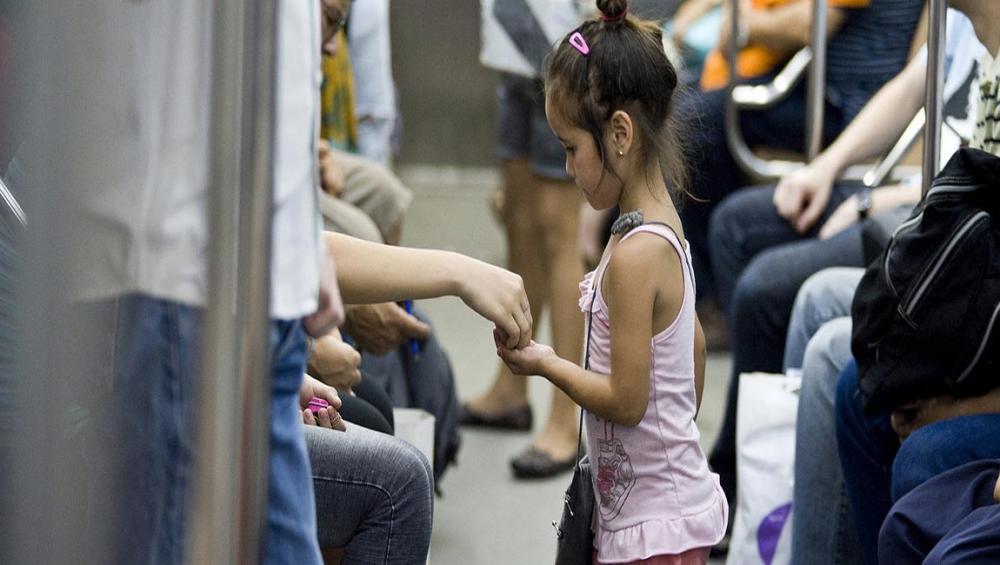Just Earth News | @JustEarthNews | 18 Jan 2019, 03:19 pm Print

UNICEF/Sebastian Rich
New York, Jan 15 (IBNS): Some Member States have fallen short of offering a better future to children who continue to die prematurely or fall victim to poverty, trafficking and slavery, UN rights chief Michelle Bachelet said on Monday.
In her opening address to the 80th Session of the Committee on the Rights of the Child, in Geneva – which reviews the records of Member States according to the Convention on the Rights of the Child - the High Commissioner noted that 2019 marked the pact’s 30th anniversary, and that it was “by far the most widely ratified human rights treaty”.
Despite this almost universal recognition, and the fact that it had “driven significant progress in many countries” with laws passed to protect youngsters in “virtually every State party”, Bachelet insisted that “not all States Parties ensure, to the maximum extent, the survival and development of all children everywhere”.
And in an appeal to listen to youngsters’ “ideas, innovations and solutions”, she insisted: “In almost every context, children are still viewed as passive recipients of care, their voices dismissed or ignored.”
This week, the UN panel of 18 independent experts is set to review the reports of Bahrain, Belgium, Guinea, Italy, Japan and Syria, in exchanges with representatives from the countries involved.
“Based on current trends, more than 60 countries will miss the SDG neo-natal mortality target,” Bachelet said, citing a UN Children’s Fund (UNICEF) estimate that 60 million children under five, will die between 2017 and 2030 from preventable causes.Turning to another powerful human rights platform – the 2030 Agenda, with its 17 Sustainable Development Goals, which world leaders adopted in September 2015 - “we are not yet on track” to deliver on its promises, the High Commissioner insisted.
On trafficking and slavery, the High Commissioner explained that children were “particularly vulnerable” to its worst manifestations: forced labour – involving some 5.5 million youngsters - domestic slavery, sexual slavery and forced marriage.
Testimonies collected by the staff and other UN bodies “clearly indicate that child migrants and internally displaced children, in every region, are at heightened risk”, she said, “and as you know, these populations are growing sharply”.
Quoting from a recent study by a UN Special Rapporteur – or independent rights expert - Bachelet noted that the share of children trafficked for the purpose of forced labour “is increasing, and the share of children involved in forced labour is particularly high”.
The High Commissioner also cited data from the United Nations Office on Drugs and Crime (UNODC), indicating that one in three detected victims of trafficking was a child.
Victims included almost double the number of girls than boys, she continued, while the trafficking of children for sexual exploitation “greatly facilitated by digital technologies, which create new marketplaces and streamline the organisation of trafficking networks”.
And on the “millions of girls” who become mothers while they are still children, Bachelet underlined that the practice damaged their health and entrenched a destructive cycle of poverty.
Armed conflict had also “traumatized and harmed millions more, she continued, adding that in 2016, UN monitors had verified more than 20,000 boys and girls who had been forcibly recruited by armed groups “as fighters or, in effect, as slaves”.
“These numbers are a calamity,” the UN rights chief said. “Each of them stands for a precious individual, whose hopes and dreams are being dashed. Tragically, there is still much to be done before we realise the four core principles of the Convention: non-discrimination, the child's best interests; right to life, survival and development and right to be heard.”
The number of ratifications of the Convention on the Rights of the Child remains unchanged at 196, although South Sudan recently ratified the Optional Protocol on the involvement of children in armed conflict, bringing the total number of ratifications to 168.
South Sudan also ratified the Optional Protocol on the sale of children, child prostitution and child pornography, which now has 175 States parties.
Recalling a special event at the UN in Geneva in December to celebrate the 70th anniversary of the Universal Declaration of Human Rights, Bachelet noted the appeal by 16-year-old Nayeli Quiroz, from Ecuador, who said more youngsters should be able to participate in decisions that directly affect them.
“We need the power, the clarity, the foresight and the good sense of these children and adolescents to help us overturn many current trends”, the High Commissioner said. “Empowering them, respecting their dignity and upholding their rights benefits everyone.”
- US: Former school teacher pleads guilty of having sex with high schoo boy 20 to 30 times
- Report shows 39 percent children are currently out of school in Pakistan
- ‘Ten weeks of hell’ for children in Gaza: UNICEF
- Weather-related disasters displace 43.1 million children in six years, UNICEF reports
- Five-year-old Kansas girl raped, murdered, key suspect arrested






